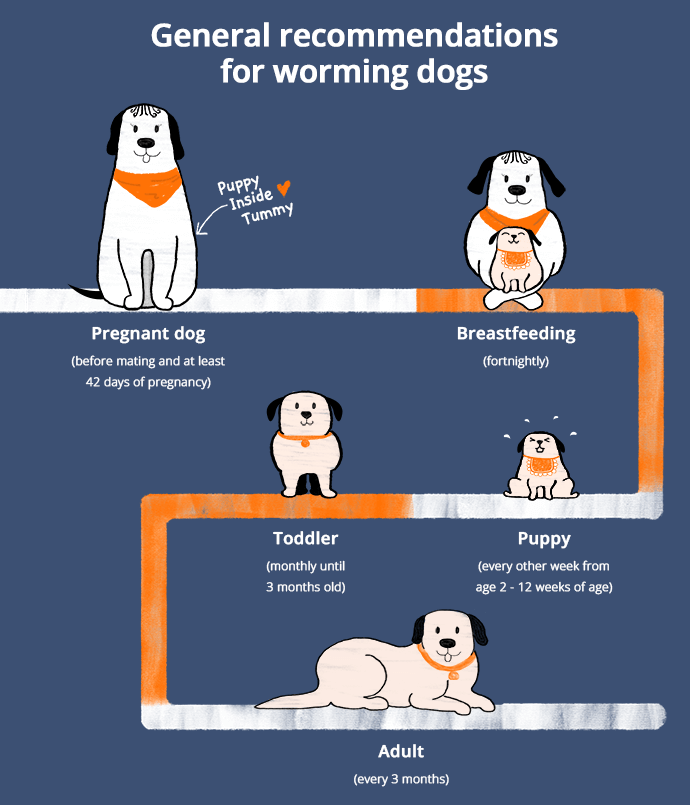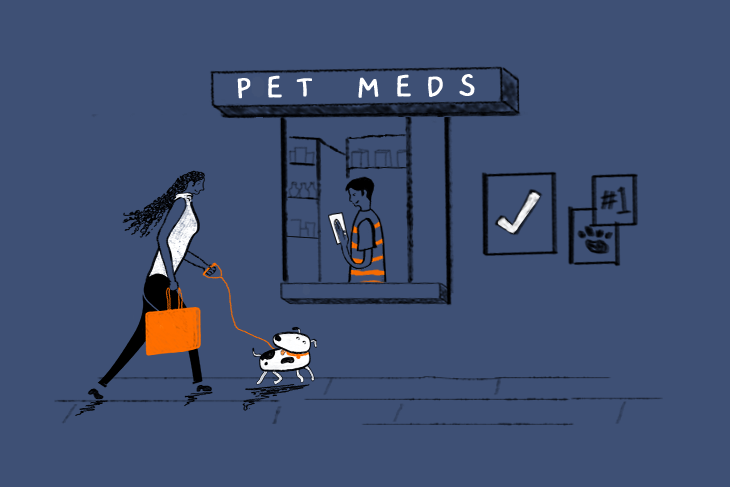June 11, 2020

Worming your dog is important for your dog's health as well as your own, because some canine parasites can be transmitted to humans. Worming frequency depends on a dog's age, its habitat, and which parasites are a problem in the areas in which the dog lives and visits.

What is worming?
For the purposes of this article, worming your dog means treating it for intestinal parasites. Giving a heartworm-preventative medication is covered in a separate Pet Shed article.
The intestinal worms commonly affecting dogs in the US are:
- roundworms (Toxocara canis and Toxascaris leonina)
- hookworms (Ancylostoma caninum, Ancylostoma brazilense and Uncinaria stenocephala)
- whipworms (Trichuris vulpis)
- and tapeworms (Dipylidium caninum, Taenia spp and very occasionally Echinococcus spp)

How can dogs get infected?
Dogs can be infected with these worms in many ways, such as accidentally swallowing them in the grass or something else they are eating, such as rabbits. Some parasites have the ability to penetrate the skin, while others can pass to the pup while it is still in its mother's womb, or be transmitted via suckling.

Why is worming important?
When worm parasites first enter a dog's body, some will move straight to the intestines while others initially migrate around the body. Problems caused by worms, mainly diarrhea, mostly related to the parasites living and feeding in the intestines, but some can cause vomiting or weight loss. Other common signs of worms include anemia, due to blood loss, or cough due to worms migrating to the lungs. Some dogs display no signs of infection at all.

How do I treat intestinal worms in dogs?
Most worming treatments will kill the adult worms in the intestines at the time of treatment, with only a few being able to target migrating parasites. The time it takes for the parasites to mature to a point where they can produce eggs is what determines the frequency of treatment in most parasite control programs.
Dog parasite treatments
Pet Shed's most popular solutions for ridding your dog of parasites
- Drontal
- Droncit
- Generic wormers
- Tapeworm tablets
"Worming your dog is important for your dog's health as well as your own because some canine parasites can be transmitted to humans."

How can worms be transmitted to humans?
Worm eggs are excreted in the feces of infected dogs. These excreted eggs develop to a larval stage infectious to humans. People who pat dogs infected with parasite larvae and forget to wash their hands before eating a meal could unintentionally infect themselves.

How should I worm my dog?
These worms can cause problems in humans when they migrate through the body. In order to prevent disease in both dogs and humans, the following are general recommendations for worming dogs:
- Puppies should be treated for intestinal worms at two, four, six, eight, ten and 12 weeks of age, then monthly until they are three months old, then at least every three months during their lifetime.
- If Echinococcus tapeworms are a problem in your area, three to six-weekly treatments are recommended instead.
- Female dogs should be wormed before mating, then from at least day 42 of pregnancy and fortnightly while the pups are suckling.
"Female dogs should be wormed before mating, then from at least day 42 of pregnancy and fortnightly while the pups are suckling."

How do I choose wormer treatments?
There are several ingredients available that effectively kill worms. Some products combine intestinal worming with heartworm prevention or flea treatment. Many products combine a number of ingredients in order to kill all of the intestinal worms listed earlier.
When selecting a product check out the list of worms against which it is effective, to ensure you are protecting your dog against all relevant worms. Your veterinarian can advise you on the most appropriate product for your pet.
References:
